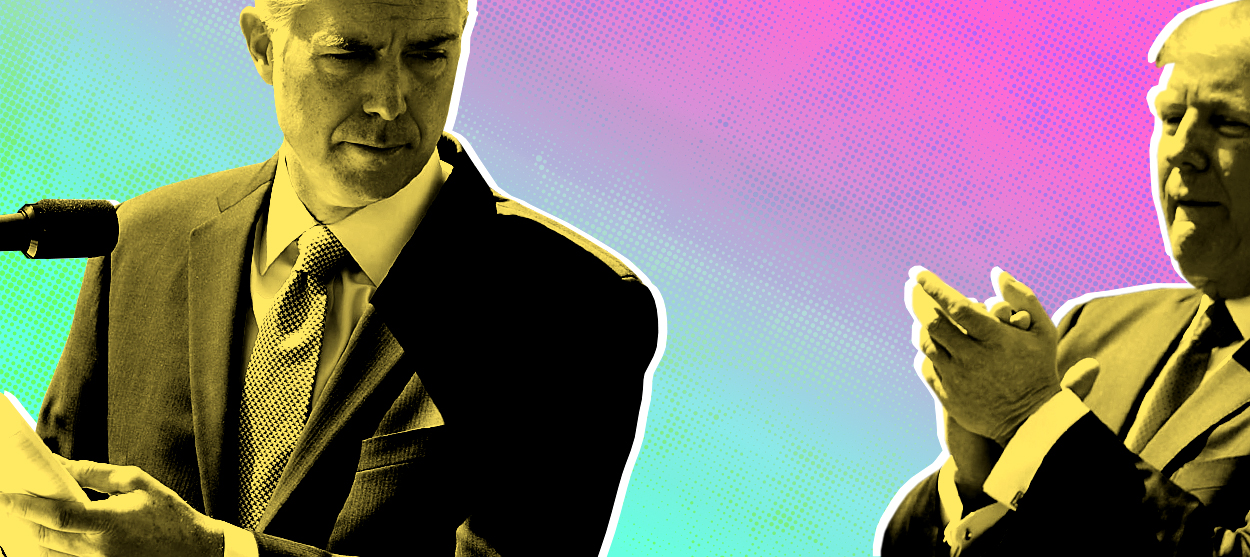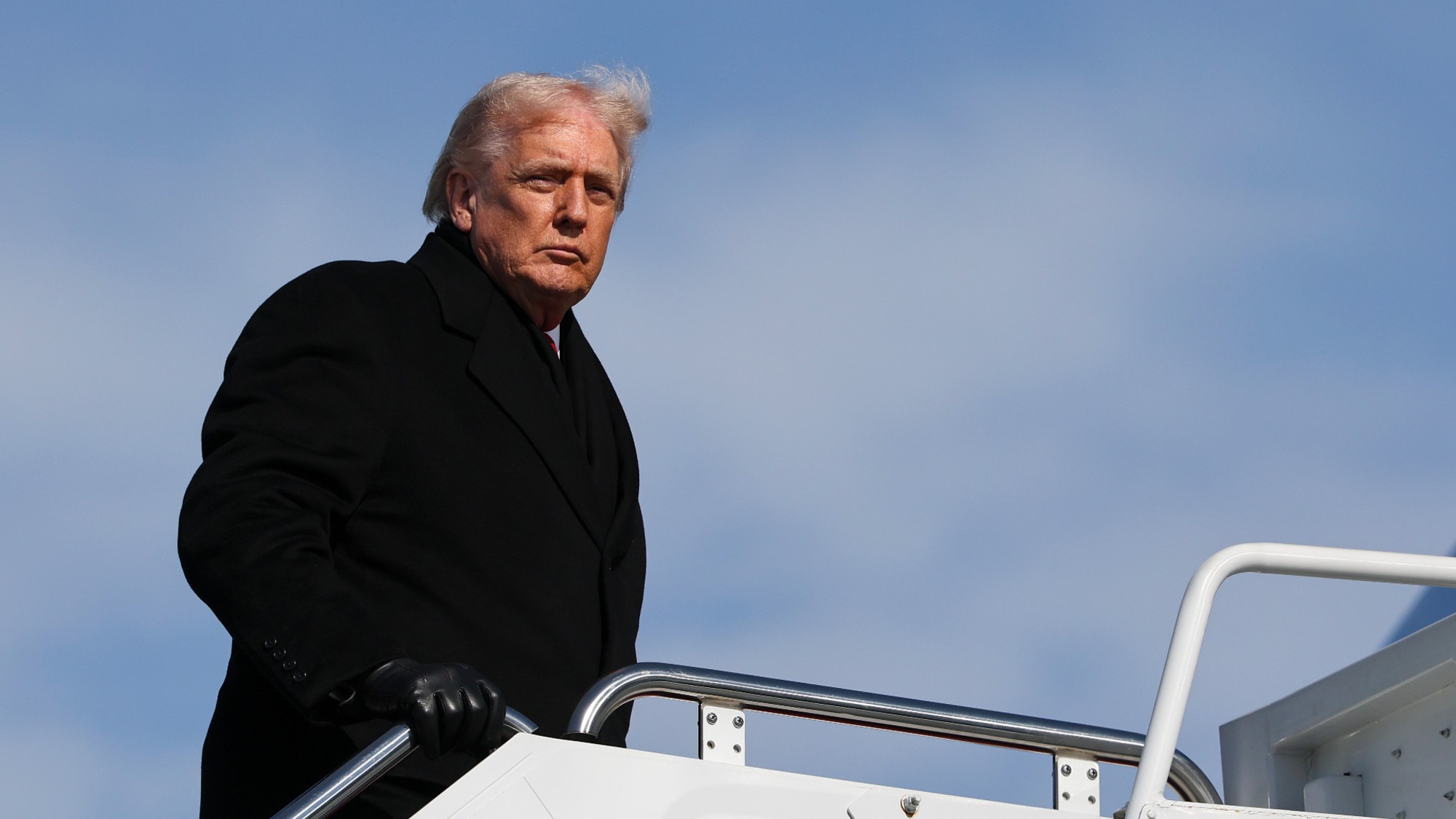Justice Gorsuch fires a torpedo at Trump's re-election
The president now has a social conservative problem


A free daily email with the biggest news stories of the day – and the best features from TheWeek.com
You are now subscribed
Your newsletter sign-up was successful
Supreme Court Justice Neil Gorsuch fired a torpedo at President Trump's re-election campaign on Monday morning. That almost certainly wasn't his intent, but it will be the political effect of the majority decision he authored in Bostock v. Clayton County and Altitude Express Inc. v. Zarda.
Progressives will cheer the high court's 6-3 decision, ruling that Title VII of the Civil Rights Act of 1964 protects gay and transgender Americans from discrimination in employment. But the fact that the majority decision was authored by Gorsuch and joined by Chief Justice John Roberts, leaving just three of the court's five conservatives in lonely dissent, will have explosive implications on the right.
During the battle for the Republican nomination in 2016, Trump at first appealed to less religious members of the party while the religious right (conservative white evangelical Protestants and conservative white Catholics) gravitated elsewhere — some to evangelical author Ben Carson, others to Florida Sen. Marco Rubio, and still others to Texas Sen. Ted Cruz. Only after Trump had locked down the nomination and pledged to appoint judges to the federal courts who had been verified as reliably conservative by the right-leaning legal organization The Federalist Society did these crucially important groups come around to supporting the ideologically and temperamentally unorthodox (and morally repellant) nominee.
The Week
Escape your echo chamber. Get the facts behind the news, plus analysis from multiple perspectives.

Sign up for The Week's Free Newsletters
From our morning news briefing to a weekly Good News Newsletter, get the best of The Week delivered directly to your inbox.
From our morning news briefing to a weekly Good News Newsletter, get the best of The Week delivered directly to your inbox.
These voters stuck with Trump through the election and have become some of his most loyal supporters ever since for one reason above all others: because Trump vowed to deliver the federal courts to social conservatives. Trump made good on this promise right out of the gate by nominating conservative Gorsuch to the seat on the Supreme Court formerly held by Antonin Scalia, who died in February 2016 and whose seat Senate Majority Leader Mitch McConnell had held open through the remainder of Barack Obama's final year in office.
By the time Gorsuch was confirmed and McConnell began fast-tracking a series of judicial nominations to the federal courts, the religious right was firmly in the president's pocket. That conservatives got a second nomination to the high court less than two years into the Trump administration, replacing the ideologically heterodox Anthony Kennedy with Federalist Society stalwart Bret Kavanaugh, only solidified the bond between Trump and social conservatives.
When Trump critics accused social conservatives of having sold their souls to a president unworthy of their adoration, the stock response was now "But Gorsuch!" Translation: Trump might have flaws, but he promised to deliver us the judiciary, and on that he's made good! No matter what happened over the coming decades in the political arena, conservatives had captured the courts, and that would ensure victories on the issues that really matter to the religious right: protecting the unborn and religious freedom, and limiting gay and transgender rights.
With his 29-page majority opinion in Bostock, Gorsuch blew that electoral rationale out of the water. Scholars can debate the legal ins and outs of the decision. In political terms, the result is going to be an earthquake to rival the one that reverberated throughout the right in the wake of Planned Parenthood v. Casey, the 1992 decision in which Republican appointees Kennedy, David Souter, and Sandra Day O'Connor joined with the court's liberals to uphold the reproductive rights of women. There are of course many reasons why George H. W. Bush lost his bid for re-election later that year. But an important one was demoralization among social conservatives, who felt betrayed by a conservative movement that held the presidency for 12 years, appointed six justices to the Supreme Court, and yet could not produce a concrete victory on an issue that mattered more to them than any other.
A free daily email with the biggest news stories of the day – and the best features from TheWeek.com
It's even possible to understand the popularity on the right of Trump's singularly combative style of politics as an expression of maximal frustration at the utter failure of conservatives to stop the courts' onward march toward progressive outcomes on social issues. The right actually wants victories on these issues — which means it wants to see decisions it considers wrongly decided overturned and majority opinions push back in the opposite direction.
What the right has gotten instead is ... not much at all. Three Republican appointees co-authored the lead plurality opinion in Casey. Kennedy, appointed to the court by Ronald Reagan, wrote the majority opinion in Obergefell v. Hodges, which declared same-sex marriage a constitutional right. And now Gorsuch himself has repeated the humiliation with Bostock.
That is going to hurt far more than these prior disappointments — because it comes a generation after Casey, after the appointment of a series of justices who received the Federalist Society stamp of approval, and after the religious right allowed its hopes to be raised by Trump's and McConnell's alacrity at getting seemingly rock-solid conservatives appointed to the courts.
If you're a conservative primarily concerned about free speech, economic liberty, and gun rights, there is much to love about the Roberts court. If you believe in expansive readings of executive power, there is a lot to cheer for in recent Supreme Court jurisprudence. But if you care about sexual morality and issues wrapped up with it? Forty years of loyalty to the conservative movement and Republican Party has delivered exactly nothing.
There's no way this won't do further damage to Trump's already foundering re-election prospects. Why should social conservatives show up to vote for a president and a party that repeatedly raises their hopes and then dashes them? Why should they continue to give the president a pass on his morally appalling words and deeds when they're left with nothing to show for it?
This doesn't mean presumptive Democratic nominee Joe Biden should expect to receive a bump in support from disaffected conservative evangelicals and Catholics. But it does mean the Trump campaign needs to anticipate these voters are now far more likely to sit this one out, convinced that the outcome of the election will make little difference to them.
Social conservatives are likely to feel like they've been played for suckers. And on that they may well be right.
Damon Linker is a senior correspondent at TheWeek.com. He is also a former contributing editor at The New Republic and the author of The Theocons and The Religious Test.
-
 The Mandelson files: Labour Svengali’s parting gift to Starmer
The Mandelson files: Labour Svengali’s parting gift to StarmerThe Explainer Texts and emails about Mandelson’s appointment as US ambassador could fuel biggest political scandal ‘for a generation’
-
 Magazine printables - February 13, 2026
Magazine printables - February 13, 2026Puzzle and Quizzes Magazine printables - February 13, 2026
-
 Heated Rivalry, Bridgerton and why sex still sells on TV
Heated Rivalry, Bridgerton and why sex still sells on TVTalking Point Gen Z – often stereotyped as prudish and puritanical – are attracted to authenticity
-
 Trump’s Kennedy Center closure plan draws ire
Trump’s Kennedy Center closure plan draws ireSpeed Read Trump said he will close the center for two years for ‘renovations’
-
 Trump's ‘weaponization czar’ demoted at DOJ
Trump's ‘weaponization czar’ demoted at DOJSpeed Read Ed Martin lost his title as assistant attorney general
-
 Gabbard faces questions on vote raid, secret complaint
Gabbard faces questions on vote raid, secret complaintSpeed Read This comes as Trump has pushed Republicans to ‘take over’ voting
-
 Greenland: The lasting damage of Trump’s tantrum
Greenland: The lasting damage of Trump’s tantrumFeature His desire for Greenland has seemingly faded away
-
 The price of forgiveness
The price of forgivenessFeature Trump’s unprecedented use of pardons has turned clemency into a big business.
-
 Will Peter Mandelson and Andrew testify to US Congress?
Will Peter Mandelson and Andrew testify to US Congress?Today's Big Question Could political pressure overcome legal obstacles and force either man to give evidence over their relationship with Jeffrey Epstein?
-
 The ‘mad king’: has Trump finally lost it?
The ‘mad king’: has Trump finally lost it?Talking Point Rambling speeches, wind turbine obsession, and an ‘unhinged’ letter to Norway’s prime minister have caused concern whether the rest of his term is ‘sustainable’
-
 A running list of everything Donald Trump’s administration, including the president, has said about his health
A running list of everything Donald Trump’s administration, including the president, has said about his healthIn Depth Some in the White House have claimed Trump has near-superhuman abilities
